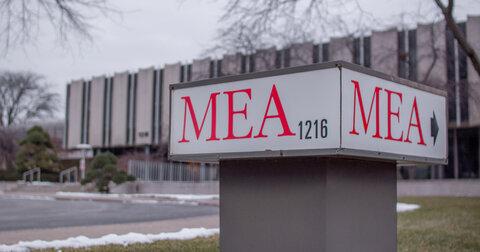Michigan Union Still Pursuing Dues From Teachers Five Years After Right-To-Work
But under new U.S. Supreme Court ruling, the union may also be messing with their constitutional rights
More than five years ago, Michigan’s right-to-work law went into effect, prohibiting employers from requiring workers pay union dues or fees as a condition of employment. Still, a leading teachers union is trying to collect fees from school employees who have exercised their right to not pay.
The issue gained heightened importance in June, when the U.S. Supreme Court effectively extended right-to-work status to all state and local government employees nationwide. In Janus v. AFSCME, the court held that compulsory union agency fees violate public sector workers’ First Amendment rights to freedom of speech and freedom of association.
In March 2018, three months before that ruling, the Michigan Education Association sued Wyoming, Michigan, public school teacher Michael Fernhout in court, claiming that he failed to the pay agency fees for the 2015-16 school year. A March email from the MEA confirms that Fernhout left the union in September 2015, but the union still claims that Fernhout owes $1,045 – a year’s worth of agency fees.
Before the Janus decision came down, unions claimed that agency fees only covered the costs associated with representing workers, not for other purposes such as political activities. These costs include negotiating collective bargaining agreements and processing employee grievances arising from provisions of the agreements. With the Janus decision, that argument may no longer be relevant, at least in the public sector workplaces the Janus ruling applies to.
Derk Wilcox, a senior attorney with the Mackinac Center Legal Foundation, said that since the Janus ruling of June 28, unions are essentially trying to collect a debt that has been found unconstitutional.
Government agencies in several states are poised to stop withholding agency fees from public employees’ paychecks, presumably to avoid liabilities for violating their constitutional rights. The New York Department of Labor has said that public sector employers may no longer withhold agency fees from employees who have not given affirmative consent. California agencies have been given similar advice by outside attorneys.
Unions also face the threat of clawbacks from employees seeking refunds of agency fees previously withheld from their paychecks for the benefit of a union. In Oregon, the Service Employees International Union Local 503 has agreed to return two years of fees collected from a employee who sued for a rebate. Under the voluntary settlement, Debora Nearman will get a check for $2,959, according to The Oregonian.
Michigan teacher Michael Fernhout told the Mackinac Center Legal Foundation that he doesn’t understand why he owes the union any money after he opted out.
“It was just astronomical, the fees to be in the union and I figured, I knew a bunch of other people that were in it that were getting out of the union and someone had told me about opt out,” Fernhout said in a video produced for the foundation. “Then I kept still, getting dues [payment notices].”
The Mackinac Center Legal Foundation, which is representing Fernhout in the lawsuit, claims that because the union contract Fernhout was under went into effect after the passage of Michigan’s right-to-work law in 2013, the union cannot force him to pay agency fees. The legal foundation and Michigan Capitol Confidential are both projects of the Mackinac Center for Public Policy.
Wilcox said he believes that in this and similar cases, the teachers union is trying to ruin the credit rating of those who opt out of membership, as well as stigmatize them as deadbeats.
“This is often for debts that are not actually owed, as is the case here,” Wilcox said in an emailed statement. “The MEA wants to act as if right-to-work were not the law, and they can still force teachers to still support them. And if the teachers don’t give in, the MEA is willing to make their lives much more difficult.”
MEA Director of Public Affairs Doug Pratt did not respond to an email and a phone call requesting comment.
Michigan Capitol Confidential is the news source produced by the Mackinac Center for Public Policy. Michigan Capitol Confidential reports with a free-market news perspective.

